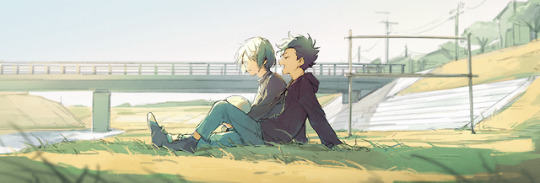"—but sometimes, human calculations were forever inferior to celestial calculations."
Don't wanna be here? Send us removal request.
Text
fandom: we are going to take the most minor of background characters and stan them so hard we forgot the main characters exist
42 notes
·
View notes
Text
i love my friends but i also can't wait to say goodbye to them to meet my future
0 notes
Text
I grow stronger every time I successfully comfort myself through a difficult situation
39K notes
·
View notes
Text
Ranwan fic rec - Navigation
A/B/O Angst + Hurt/ Comfort Bakery AU Camboy AU Canon Divergence College/Uni AU Corporate/ Office AU Daddy Kink Dead Dove Escort AU Genderbend/ Fem Jealousy Mafia AU Medical AU Mpreg Period/ Historical AU Post Canon Robot AU Role Reversal Stalker AU Twitter Fic Threads
447 notes
·
View notes
Text
the second half of that “hell is too cold” line
One super iconic line in 2ha is Taxian-jun’s “hell is too cold, Chu Wanning, I’ll take you to the grave with me” (Ch. 57; echoed later). The word in Chinese that rynn has translated as “take to the grave” is 殉 (xùn), which has several shades of meaning that are pretty interesting to me in the context of the story!
Here’s the line in Chinese:
地狱太冷了,楚晚宁,你来殉我。
The first clause, 地狱太冷了, is straightforward: 地狱 = hell/underworld, 太冷 = too cold, 了 = intensifying modal particle. 楚晚宁 = Chu Wanning.
The last clause, 你来殉我, broken down:
你 = you 来 = come 殉 = die with, die for (more on this) 我 = me
Rynn’s “I’ll take you to the grave with me” reverses subject/object, but is sexy and memorable and also captures the feeling of the line, which is that Taxian-jun isn’t intending to give Chu Wanning any choice in the matter.
So what can 殉 mean and how is it relevant here? (at least according to my trawling zdic and baidu for an hour lol)
(1) to be buried with the dead. Historically, emperors and high-ranking officials would often be buried with subjects and concubines. The living would usually (but not always) be killed in some manner before being put into the grave.
It makes sense that Emperor Taxian-jun would say this to his Chu-fei (the bit that follows in Ch. 57 gets more descriptive). Also notable is the implication that TXJ will die before CWN, that CWN will have to lose his own life to accompany TXJ in death as he had in life. Definitely a power play (and a cruel one).
(2) to sacrifice one’s life for a cause. In this case, 殉 is often combined with a noun (the cause in question), e.g. 殉职 = to die in the line of duty, 殉国 = to die for one’s country. Basically think martyrdom of some sort, dying for something greater than oneself that’s often abstract.
I’m intrigued by this valence because it suggests a more voluntary sacrifice than the former. Which is certainly the opposite of what TXJ means (he tells CWN over and over again that life and death aren’t up to him). But considering what happens later in both timelines, Chu Wanning indeed does his best to turn this reading into a reality.
46 notes
·
View notes
Photo


I’ve always loved the thought of Dramione from the very beginning.
7 notes
·
View notes
















